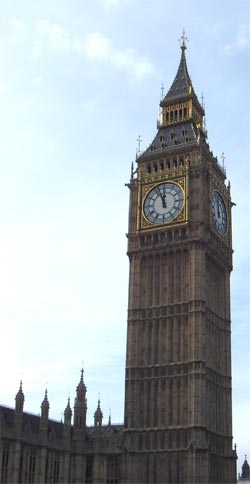| Département d'anglais | Press and media | Suggested reading | Seminars and texts | Lectures and presentations | Links |

|
Civilisation britannique/British history, institutions and society |
|
Seminars (TDs) Andréa Baron and Anne-Claire Cauhapé, 12 one-hour sessions (group A Monday 1.30 room 318 ACC, gp B Monday 9.30 room 121 AB, group C Monday 11.30 room 134 AAC, group D Friday 10.00 room 121 ACC) Week 3 6-10 March. Document one (a photo of rubbish in a London square during the "winter of discontent") Document two (a comment on the "Third Way"). In 1970 Labour--to everyone's great surprise-- lost the general election to the Conservative Edward Heath. Heath began his mandate with a radical Conservative programme: he would not support ailing industries, for exampkle ("lame ducks") but would allow the market to operated. However when unemployment rose he made a "U-turn", rejecting what he called the "unacceptable face of capitalism". He tried--and failed--to reduce the power of the trade unions. His greatest success was undoubtedly in negotiating membership of the European Economic Community, where both Macmillan and Wilson had failed in the face of opposition from France's General de Gaulle. Heath fell after a prolonged miners' strike in the winter of 1973-1974. Harold Wilson returned as Prime Minister. The 1970s saw Britain reeling from the shock of the oil crisis of 1973. Inflation was running at over 20%. Labour managed to rein in inflation through a series of agreements with the unions in the "social contract", but towards the end of the decade the membership grew restless. The winter of 1978-1979 was marked by a series of strikes, especially in the public sector, which left a lasting image in people's minds. The "winter of discontent" was a significant factor in the Conservative victory at the general election of 1979 under Margaret Thatcher, who had become leader of the Conservative party in 1975 when Edward Heath resigned. The mid-1970s also saw a considerable growth in the nationalist movements in Scotland (Scottish National Party SNP) and Wales (Plaid Cymru). After the general election, the Labour party entered into a prolonged period of internal dissensions, much as it had done after 1951. The "Hard Left" made a number of advances, gaining greater control over the selection of candidates for parliamentary elections, for instance. It also vigorously opposed British membership of the EEC. Labour MPs of the centre began to feel isolated and vulnerable, and four prominent Labour politicians decided to break away from Labour in 1981 and form the Social Democratic Party (SDP). It was a time of unrest in the inner cities, with spectacular riots in Brixton and elsewhere in protest against police harrassment, particularly of ethnic minorities. Margaret Thatcher's radical economic policies had led to a dramatic increase in unemployment, which soon reached three million. In 1982 Britain was unexpectedly confronted with the invasion of a British colony by a foreign country. The Falkland Islands were occupied by Argentina and Mrs Thatcher decided to send a task force to restore them to British sovereignty. She emerged strengthened from the war which ensued, her determination and resolution appealing to many. In 1984 (after a landslide victory at the 1983 election) Margaret Thatcher confronted a protracted miners' strike. After a year, the miners capitulated. By the end of the decade Mrs Thatcher's determination looked more like obstinacy and she began to be seen as an electoral liability. In November 1990 she was forced to resign after a challenge to her position as leader of the party. John Major became PM. Major won an election victory in 1992, but was dogged by Conservative opposition to Maastricht. His party was also marred by a series of scandals ("sleaze"). During all this time Labour was regaining ground, first under Neil Kinnock, then John Smith and finally, after John Smith's sudden death, by Tony Blair. The party had been reformed and renewed and had become "electable" once again. In 1997 Blair and New Labour won a spectacular election victory, leaving the Conservatives shattered. They have still not really recovered, despite the controversy over Blair's decision to join the USA in the war against Iraq. Blair often refers to a "Third Way" between Conservative policies and the policies of "Old Labour", though there has been some doubt about what such a third way might really mean. The new Conservative leader David Cameron looks an increasingly formidable figure and the Conservatives'fortunes are looking brighter than at any time since 1997. Blair is expected to stand down some time soon (but when??) and be replaced by his Chancellor of the Exchequer Gordon Brown. |